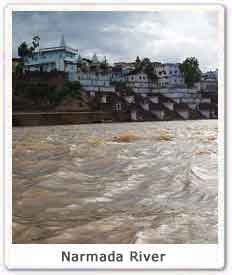Amarkantak is the place from where the Narmada river originates. It rises from the Maikal ranges at the height of 1057 meter above the sea level. Amarkantak is located in the Shahdol district of Madhya Pradesh in India. Narmada river mainly flows in the central India. The total length of the Narmada river lies approximately 1,289 kms. The river flows from the eastward direction to the westward into the Arabian sea. It merges into the ocean at the point called 'Bharonch'. It is the largest west flowing river in India.
 Religious
Significance :
Religious
Significance : Narmada is one of the sacred rivers of India. It is said that by taking a bath in the holy Narmada river, man can be freed from all the sins of his life. The water of Narmada river purifies a man and help him in attaining salvation. Among the people in India, Narmada River is considered as the mother and the giver of peace. The Narmada finds mention in ancient texts of India as one of the seven most sacred rivers in India. The river is considered as the Goddess and is worshiped in India. There are numerous thirthas on the banks of the river, the most important among them are Mahewswar and Omkareshwar tempes.
History :
According to the legends, Narmada river came down from the sky as by the order of the Lord Shiva. Some also says that the Narmada river also sprangs from the body of the Lord Shiva, while performing the tandava (Lord Shiva's cosmic dance). Narmada means 'Giving Pleasure'. In Sanskrit Narma means 'pleasure' and da refers to 'to give'. In some parts of India Narmada is also known as Narbada.
The Narmada Valley Project :
After the commencement of the five year plan there has been demand to fully utilize the water of Narmada. As the Narmada flows through the states of Madhya Pradesh, Gujrat and Maharashtra has led to the dispute among these concerned states. In order to solve the problem, the Government of India constituted the Narmada Water Dispute Tribunal. The plan was meet the water requirement of the people and industries as well as the regular supply to them. Large population of India including the tribal population such as Gonds, Bhils, Santhals, Kurkus are heavily dependent on its water. According to the current plans, Narmada basin has 3200 dams. Out of these 30 are the major dams, 135 are the medium one and rest are small. The plan is to provide substantial amount of electricity and provide water for irrigation of millions of acres of crop land.
Along the river :
The Narmada river has also supported large variety of people with distinguish culture and traditions ranging from indigenous tribal people inhabitating in the forest areas to the rural population. The banks of the Narmada river are dotted with many temples. On the starting point of the Narmada river lies a open pond known as the Narmadakund. The pond is surrounded by many temples such as Shiva temple, Shri Ram Janki temple, Annapurna temple, Durga temple, Vangeshwar Mahadev temple, Shiv Pariwar, Sri Radha Krishna temple, Guru Gorakhnath temple, Kartikey temple and many more. The river supports the great variety of aquatic life, which includes marsh crocodile and masher fish. Apart from that large number of wild animals and their natural habitats can also be spotted here such as tiger, gaur, sloth buck, black bear, boar, wild dog and many more.






